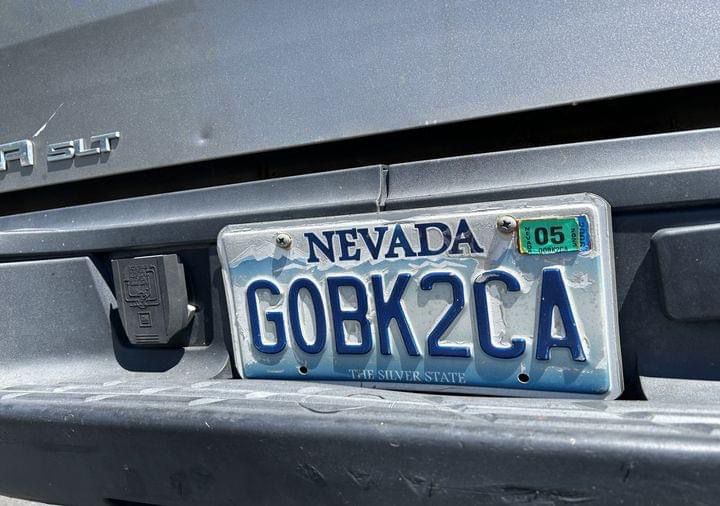A Nevada vanity license plate recently caught national attention for its bold message: “Go back to California.” After a photo of the plate was posted on Facebook, it quickly went viral—amassing more than 80,000 likes and thousands of shares. What began as a roadside curiosity turned into a broader conversation about state identity, migration trends, and the limits of personal expression.
However, the attention didn’t last long. The Nevada Department of Motor Vehicles has since revoked the plate, citing a violation of guidelines that prohibit personalized plates with messages deemed offensive or divisive. While the plate didn’t include profanity or explicit content, DMV officials concluded that its tone could be interpreted as antagonistic—especially given current regional tensions.
A Sign of Regional Frustration?
In recent years, Nevada has seen a noticeable rise in migration from neighboring California, driven largely by more affordable housing, less congestion, and different lifestyle options. While this growth has brought economic benefits, it has also sparked concern among some long-time residents who fear changes to the culture and cost of living.
The license plate quickly became a symbol of this ongoing shift—seen by some as a humorous expression of state pride, and by others as an unwelcoming message in a time of increased mobility across state lines.
This isn’t the first time a vanity plate has stirred controversy. Nevada’s DMV screens thousands of personalized plate requests each year and regularly declines those that suggest inappropriate, aggressive, or controversial meanings. Some previously rejected plates include “SAUC3D,” “RAMP4GE,” and “BUYAGRAM,” which were flagged for potentially suggestive or sensitive themes.
Each plate submission is reviewed by a panel to ensure it aligns with community standards and avoids language or messages that could be misinterpreted or lead to conflict on the road.
Why This One Went Viral
What made the “Go back to California” plate different was the power of social media. Once the image hit the internet, it became more than a message on a bumper—it sparked a viral moment. Some users shared the image with lighthearted commentary. Others expressed concerns about the tone of the message, noting how quickly personal expression can shift into public debate.
Online conversations included a mix of humor, critique, and shared experiences. One user joked, “Nevadans are getting creative,” while another said, “It’s a reminder of how deeply people feel about where they live.”
Expression in the Digital Age
Whether it’s a license plate, bumper sticker, or window decal, personal vehicle messages are increasingly becoming small windows into public sentiment. In the age of digital virality, a few words on a plate can spark widespread discussion—touching on themes of identity, community, and change.
The individual behind the now-revoked plate has not been identified, but the message they shared clearly resonated far beyond Nevada. For better or worse, it highlighted the strong feelings surrounding interstate migration—and how modern platforms amplify even the most unexpected expressions of opinion.
Looking Ahead
As DMV regulations continue to evolve and social media keeps pushing everyday moments into the spotlight, this incident is a reminder: what we choose to display, even in small ways, can quickly become part of a much larger conversation.
